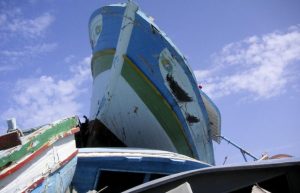Traffic increasing along world’s deadliest migration route
The numbers of refugees making the world’s deadliest migrant journey has hit record levels with 32,000 people arriving in the Canary Islands this year.
The figure breaks a 17-year-old record for arrivals in the Spanish archipelago.
Recently, four boats carrying a total of 739 people arrived at El Hierro, the smallest and most westerly of the Canary Islands, along with the bodies of two people who had died on the perilous Atlantic route from Africa. Two more died in hospital.
The latest arrivals bring the total number who have reached the archipelago since the beginning of the year to 31,933. During the small boat crisis in 2006, 31,678 people made it to the Canaries.
 Recently, the Spanish Coastguard reported that More than 500 migrants were rescued in the Atlantic Ocean off the Canary Islands.
Recently, the Spanish Coastguard reported that More than 500 migrants were rescued in the Atlantic Ocean off the Canary Islands.
According to data from Spain’s interior ministry, 14,976 people arrived in the Canaries October alone, putting massive strain on the islands’ infrastructure and resources.
This year’s arrival figures are already more than double last year’s.
And the International Organisation for Migration said that between January and December 2022, 15,681 people reached the Canary Islands by boat from West Africa, a decrease of 30 per cent, or 6,634 people, compared with the previous year.
The Canary Islands route, along which shipwrecks are frequent, has been particularly busy in recent years because of tighter controls in the Mediterranean.
Spain’s interior ministry said most of the arrivals are from sub-Saharan Africa, and in particular Senegal.
At the end of October, the Spanish government said it was setting up emergency accommodation in three military facilities near Madrid that would house about 3,000 people who had been transferred to the mainland and put up in hotels.
Spanish authorities have met with Senegal officials to discuss strategies for tackling the people-traffickers transporting people from the West African country to the Canaries.












